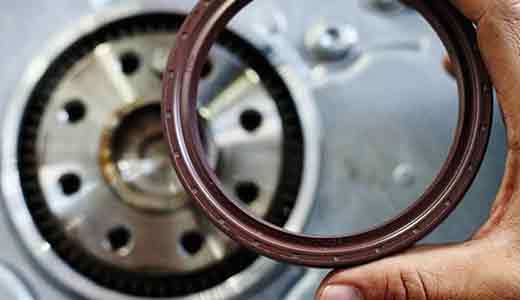Popular Information
Add: Yongkang st.renxian,xingtai city,hebei province china.054000
Tel:+86-319-7566977 7519805
Phone : +8613903298188
Fax:+86-319-7566976
E-mail :richard@bxseals.com
Maximize Your Equipment's Lifespan with the Right Oil Seals: A Comprehensive Guide
Release Time:
Oct 26,2025
Maximize Your Equipment's Lifespan with the Right Oil Seals Table of Contents Understanding Oil Seals and Their Importance Types of Oil Seals: Selecting the Right One Lip-Type Oil Seals Mechanical Seals Rubber Oil Seals Applications of Oil Seals in Automotive Systems Benefits of Using Quality Oil Seals Maintaining Oil Seals
Maximize Your Equipment's Lifespan with the Right Oil Seals
Table of Contents
- Understanding Oil Seals and Their Importance
- Types of Oil Seals: Selecting the Right One
- Applications of Oil Seals in Automotive Systems
- Benefits of Using Quality Oil Seals
- Maintaining Oil Seals for Longevity
- Common Issues with Oil Seals
- FAQs about Oil Seals
- Conclusion: Protect Your Investment with Quality Oil Seals
Understanding Oil Seals and Their Importance
Oil seals play a **pivotal role** in maintaining the integrity of various automotive systems. These essential components prevent the leakage of oils and fluids, ensuring that your equipment operates smoothly and efficiently. When oil seals are compromised, it can lead to significant damage, costly repairs, and reduced equipment lifespan. By investing in the right oil seals, you can maximize your equipment's performance and longevity.
Types of Oil Seals: Selecting the Right One
Choosing the correct type of oil seal for your application is critical. Various types of oil seals serve different functions and come in numerous sizes and materials.
Lip-Type Oil Seals
Lip-type oil seals are one of the most common types used in automotive applications. These seals feature a flexible lip that makes contact with the rotating shaft, providing an effective barrier against lubricant leakage. They are ideal for preventing contaminants from entering the system, thus ensuring optimal performance.
Mechanical Seals
Mechanical seals are primarily used in pumps, compressors, and other rotating equipment. Unlike lip-type seals, mechanical seals utilize spring-loaded components to create a tight seal, preventing leaks effectively. Their design allows for better handling of high pressure and temperature variations.
Rubber Oil Seals
Rubber oil seals are versatile and widely used across various applications. Their elasticity allows for a snug fit, accommodating slight variations in shaft size and alignment. They are known for their durability and resistance to wear, making them an excellent choice for long-term use.
Applications of Oil Seals in Automotive Systems
Oil seals are integral to various automotive systems. From engines to transmissions, they perform critical functions that enhance the overall efficiency of the vehicle.
Engine Systems
In engine systems, oil seals prevent oil leakage from critical components, such as the crankshaft and camshaft. By maintaining proper oil levels, these seals ensure that the engine remains lubricated, reducing wear and tear on moving parts.
Transmission Systems
Oil seals in transmission systems prevent fluid loss, allowing for smooth gear transitions and enhanced performance. They protect the transmission from contaminants that may lead to costly repairs and reduced efficiency.
Suspension Systems
In suspension systems, oil seals help keep the hydraulic fluid contained within shock absorbers and struts. By doing so, they ensure optimal performance and ride comfort.
Benefits of Using Quality Oil Seals
Investing in high-quality oil seals offers numerous advantages that can significantly impact the performance and longevity of your equipment.
Enhanced Performance
Quality oil seals ensure minimal leakage, which translates to consistent performance. By preventing fluid loss, these seals allow systems to operate at optimal levels, enhancing overall efficiency.
Cost Savings
While quality oil seals may require a higher initial investment, they lead to substantial cost savings in the long run. Reduced fluid leakage means lower replenishment costs and less frequent repairs.
Increased Equipment Lifespan
Using the right oil seals prolongs the lifespan of your equipment. By preventing fluid contamination and maintaining proper lubrication, you can avoid premature wear and tear on vital components.
Maintaining Oil Seals for Longevity
Maintaining your oil seals is essential for ensuring their longevity and effectiveness. Regular inspections and proper care can help prevent issues before they arise.
Inspection and Replacement Tips
Routine inspections of oil seals are crucial for identifying signs of wear, such as cracks, tears, or deformation. If any of these issues are detected, timely replacement is necessary to prevent further damage. Additionally, during maintenance, ensure that the seals are properly lubricated to avoid dry running, which can lead to premature failure.
Common Issues with Oil Seals
Understanding common issues associated with oil seals can help you take proactive measures to mitigate potential problems.
Oil Leakage
One of the most prevalent issues is oil leakage, which can arise from improper installation, wear, or damage to the seal. Regular inspections can help identify and address leaks early.
Contamination
Contaminants can compromise the integrity of oil seals, leading to premature failure. Using high-quality seals and ensuring proper installation can help minimize this risk.
Dry Rot
Rubber seals are susceptible to dry rot, particularly if exposed to extreme temperatures or chemicals. Storing equipment in controlled environments can extend the life of rubber seals.
FAQs about Oil Seals
1. What is an oil seal, and why is it important?
Oil seals are components that prevent the leakage of lubricants and fluids in machinery. They are essential for maintaining the efficiency and longevity of equipment.
2. How often should oil seals be inspected?
It is advisable to inspect oil seals regularly, especially during routine maintenance, to identify any signs of wear or damage.
3. Can I replace oil seals myself?
While it is possible to replace oil seals yourself, it is recommended to consult a professional if you are unsure about the installation process.
4. What materials are commonly used in oil seals?
Oil seals can be made from various materials, including rubber, silicone, and polyurethane, each offering unique benefits for specific applications.
5. How do I know if an oil seal needs to be replaced?
Signs that an oil seal may need replacement include visible wear, leakage of oils or fluids, and decreased performance in the machinery.
Conclusion: Protect Your Investment with Quality Oil Seals
Maximizing your equipment's lifespan is achievable with the right oil seals. By understanding the different types of oil seals, their applications, and the importance of maintenance, you can make informed decisions that enhance performance and protect your investment. Quality oil seals contribute to improved efficiency and reduced costs, ensuring that your machinery operates at its best for years to come. Investing in these critical components is not just a choice—it's a commitment to the longevity and reliability of your equipment.
Key words:



